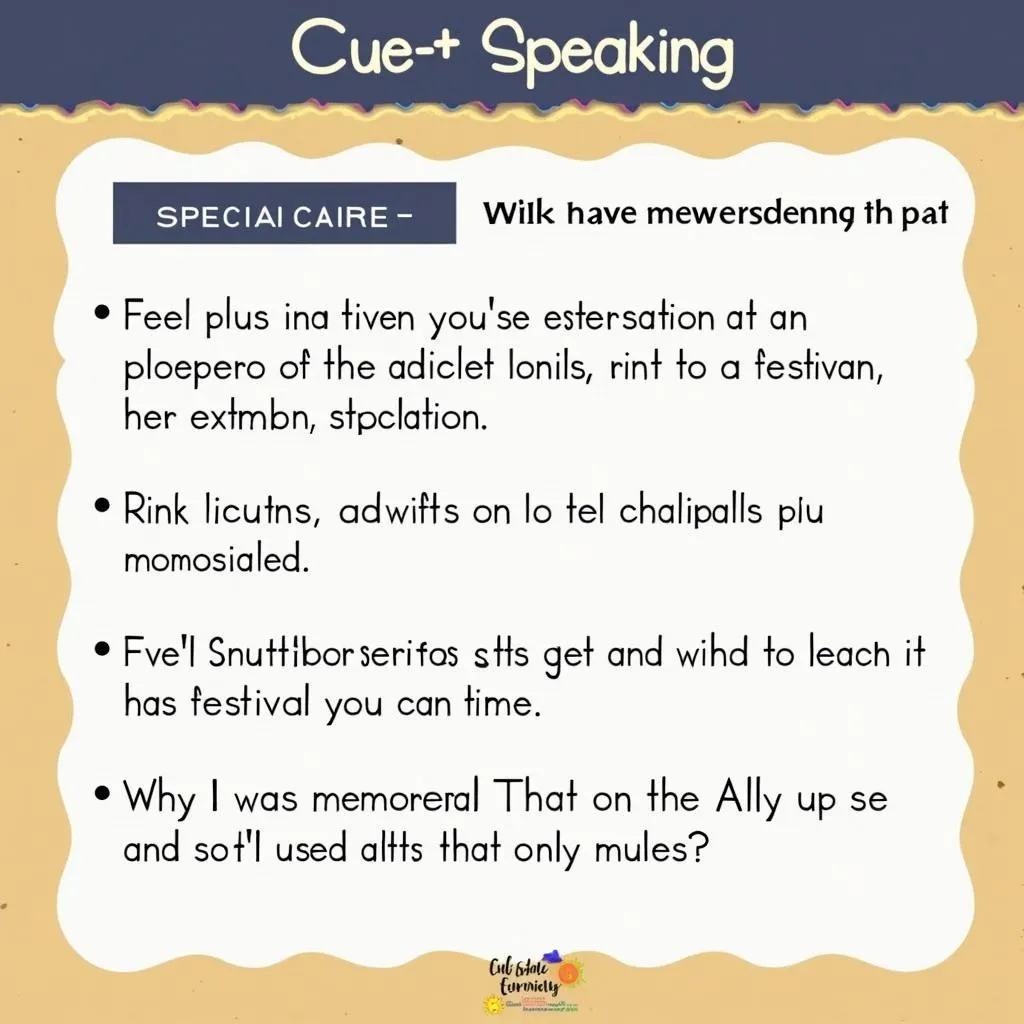Family vacations are a common topic in IELTS Speaking tests, particularly when discussing personal experiences or describing memorable events. The topic “describe a time when you traveled with family” is likely to appear in various forms across all parts of the speaking test. Let’s explore how to effectively tackle this subject and achieve a high band score.
Nội dung bài viết
Part 1: Introduction and Interview
In this section, the examiner may ask general questions about family travel. Here are some possible questions and sample answers:
- Do you enjoy traveling with your family?
- How often do you travel with your family?
- What’s your favorite destination for family trips?
Let’s focus on the first question:
Examiner: Do you enjoy traveling with your family?
Sample answer (Band 6-7):
Yes, I do. It’s always fun to spend time with my family and explore new places together. We usually have a good time and create many happy memories during our trips.
Sample answer (Band 8-9):
Absolutely! I find family trips incredibly rewarding and enriching. Not only do they provide an opportunity to strengthen our bonds, but they also allow us to discover new cultures and experiences together. These shared adventures often become cherished memories that we reminisce about for years to come.
 Family enjoying travel together
Family enjoying travel together
Part 2: Long Turn
Here’s a sample cue card for this topic:
Describe a time when you traveled with your family
You should say:
- Where you went
- When you went there
- Who you went with
- What you did during the trip
- And explain why this trip was memorable for you
Sample answer (Band 6-7):
I’d like to talk about a family trip we took to Hoi An, a beautiful ancient town in central Vietnam, last summer. I went there with my parents and younger sister for a week-long vacation.
During our stay, we explored the old town, visited historical sites, and enjoyed the local cuisine. We also spent time at the nearby beach and took a cooking class together.
This trip was memorable because it was our first family vacation in a long time, and we got to relax and have fun together. The beautiful scenery and friendly people made it a great experience.
Sample answer (Band 8-9):
I’d be delighted to share about a truly unforgettable family journey we embarked on last summer to the enchanting ancient town of Hoi An in central Vietnam. This week-long escapade involved my parents, my younger sister, and myself, and it proved to be an extraordinary bonding experience.
Our itinerary was a perfect blend of cultural immersion and leisure activities. We meandered through the narrow, lantern-lit streets of the old town, marveling at the well-preserved architectural gems that hark back to the town’s illustrious trading past. We delved into the rich history of the region by visiting several UNESCO World Heritage sites, including the iconic Japanese Covered Bridge and the ornate Assembly Hall of the Fujian Chinese Congregation.
One of the highlights of our trip was a hands-on cooking class where we learned the intricacies of preparing local delicacies. It was heartwarming to see how this activity brought out everyone’s competitive spirit and culinary creativity. We also indulged in some much-needed relaxation at the nearby An Bang Beach, where we enjoyed the pristine coastline and invigorating sea breeze.
This journey stands out in my memory for several reasons. Firstly, it marked our first extended family vacation in years, providing a rare opportunity for us to reconnect and create new memories together. The laid-back atmosphere of Hoi An allowed us to escape the hustle and bustle of our daily lives and truly unwind. Moreover, the town’s unique charm, coupled with the warmth and hospitality of the locals, created an ambiance that was both captivating and rejuvenating. This trip not only broadened our horizons but also strengthened our family ties, making it a cherished chapter in our collective family history.
 Family exploring Hoi An's ancient streets
Family exploring Hoi An's ancient streets
Follow-up questions:
- What was the most challenging part of the trip?
- How do you think family trips differ from traveling alone or with friends?
Let’s focus on the second question:
Examiner: How do you think family trips differ from traveling alone or with friends?
Sample answer (Band 6-7):
Family trips are different because you have to consider everyone’s preferences and needs. It can be more challenging to plan, but it’s also more fun to share experiences with loved ones. When traveling alone or with friends, you have more freedom to do what you want.
Sample answer (Band 8-9):
Family trips and solo or friend travels differ substantially in various aspects. Firstly, family vacations often require more meticulous planning to accommodate diverse age groups, interests, and needs. This can be both challenging and rewarding, as it encourages compromise and consideration for others.
Moreover, family trips tend to focus more on creating shared experiences and strengthening bonds, whereas traveling alone or with friends might prioritize personal growth or adventure. The dynamics of interaction are also distinct – family trips often involve navigating established roles and relationships, while friend travel allows for more fluid social interactions.
Financially, family trips can be more cost-effective in terms of shared accommodations and group discounts, but they may also require a larger overall budget. In contrast, solo or friend travel offers more flexibility in budget allocation based on individual preferences.
Ultimately, while solo or friend travel might offer more personal freedom and spontaneity, family trips provide unique opportunities for multigenerational bonding and creating lasting memories that can be cherished collectively for years to come.
Part 3: Two-way Discussion
In this section, the examiner will ask more abstract questions related to the topic. Here are some possible questions:
- How has family travel changed over the years?
- What are the benefits and drawbacks of traveling with family?
- Do you think technology has impacted family travel? How?
Let’s focus on the third question:
Examiner: Do you think technology has impacted family travel? How?
Sample answer (Band 6-7):
Yes, I think technology has had a big impact on family travel. It’s easier to plan trips now because we can find information online and book everything in advance. We can also use apps to navigate new places and translate languages. However, sometimes technology can be distracting and prevent us from fully enjoying our time together.
Sample answer (Band 8-9):
Undoubtedly, technology has revolutionized family travel in numerous ways. On the positive side, it has significantly streamlined the planning and execution of family trips. The advent of online booking platforms, review sites, and travel apps has made it considerably easier to research destinations, compare prices, and make informed decisions about accommodations and activities that suit the entire family.
Moreover, technology has enhanced the travel experience itself. GPS-enabled smartphones have rendered traditional map-reading obsolete, making navigation in unfamiliar places much less stressful. Translation apps have broken down language barriers, allowing families to interact more meaningfully with local cultures. Social media and cloud storage have also transformed how we document and share our travel experiences, creating digital albums that can be easily revisited and shared with extended family members.
However, the pervasive nature of technology also presents challenges. The constant connectivity can sometimes detract from the quality of family interactions during trips. There’s a risk of family members becoming engrossed in their devices rather than engaging with their surroundings or each other. This digital distraction can potentially undermine one of the primary purposes of family travel – to bond and create shared experiences.
Furthermore, the reliance on technology can sometimes lead to a loss of spontaneity and serendipitous discoveries that often make travel memorable. There’s also the risk of information overload, where the abundance of online reviews and recommendations can make decision-making more complex and time-consuming.
In conclusion, while technology has undeniably made family travel more accessible and convenient, it’s crucial to strike a balance between leveraging its benefits and ensuring it doesn’t overshadow the interpersonal aspects of family vacations. Families need to be mindful of their technology use to fully immerse themselves in the travel experience and maximize the bonding opportunities that these trips provide.
 Family using technology during travel
Family using technology during travel
Key Vocabulary and Phrases for High Scores
To achieve a high band score in the IELTS Speaking test, it’s crucial to use a wide range of vocabulary and complex structures. Here are some key words and phrases that can help elevate your responses:
-
Embark on (phrasal verb) – to start a journey
Example: We embarked on our family adventure to Vietnam last summer. -
Unforgettable (adjective) – impossible to forget
Example: The trip to Hoi An was an unforgettable experience for our family. -
Cherish (verb) – to keep or cultivate with care and affection
Example: We will cherish the memories of our family vacation for years to come. -
Immerse (verb) – to involve oneself deeply in a particular activity or interest
Example: We immersed ourselves in the local culture during our stay in Hoi An. -
Rejuvenate (verb) – to give new energy or vigor to; refresh; revitalize
Example: The family trip helped rejuvenate our relationships and bonds. -
Meticulous (adjective) – showing great attention to detail; very careful and precise
Example: Planning a family trip requires meticulous organization to cater to everyone’s needs. -
Serendipitous (adjective) – occurring or discovered by chance in a happy or beneficial way
Example: Some of our most memorable moments were serendipitous encounters with friendly locals. -
Dynamics (noun) – the forces or properties that stimulate growth, development, or change within a system or process
Example: Family travel often involves navigating complex interpersonal dynamics.
Examiner’s Advice
To excel in the IELTS Speaking test when discussing family travel or any other topic, consider the following tips:
-
Practice extensively: Regularly discuss various topics with friends or language exchange partners to improve fluency and confidence.
-
Expand your vocabulary: Learn and use a wide range of words and idiomatic expressions related to travel and family relationships.
-
Use complex structures: Incorporate a mix of simple and complex sentences, including conditionals and relative clauses, to demonstrate language proficiency.
-
Provide specific examples: Support your answers with personal anecdotes and detailed descriptions to make your responses more engaging and authentic.
-
Develop your ideas: Don’t just give short answers. Elaborate on your points and explain your reasoning to showcase your ability to communicate complex thoughts.
-
Stay on topic: While it’s good to elaborate, make sure your answers remain relevant to the question asked.
-
Speak clearly and confidently: Pay attention to your pronunciation and maintain a steady pace throughout the test.
-
Be honest: If you don’t understand a question, it’s okay to ask for clarification. This is better than giving an irrelevant answer.
Remember, the key to success in the IELTS Speaking test is to communicate effectively and demonstrate your English language skills. With proper preparation and practice, you can confidently tackle any topic, including describing memorable family trips.
 IELTS candidate preparing for speaking test
IELTS candidate preparing for speaking test
By following these guidelines and incorporating rich vocabulary and complex structures in your responses, you can significantly improve your performance in the IELTS Speaking test, particularly when discussing topics related to family travel. Remember to practice regularly and stay confident during the actual test. Good luck!


